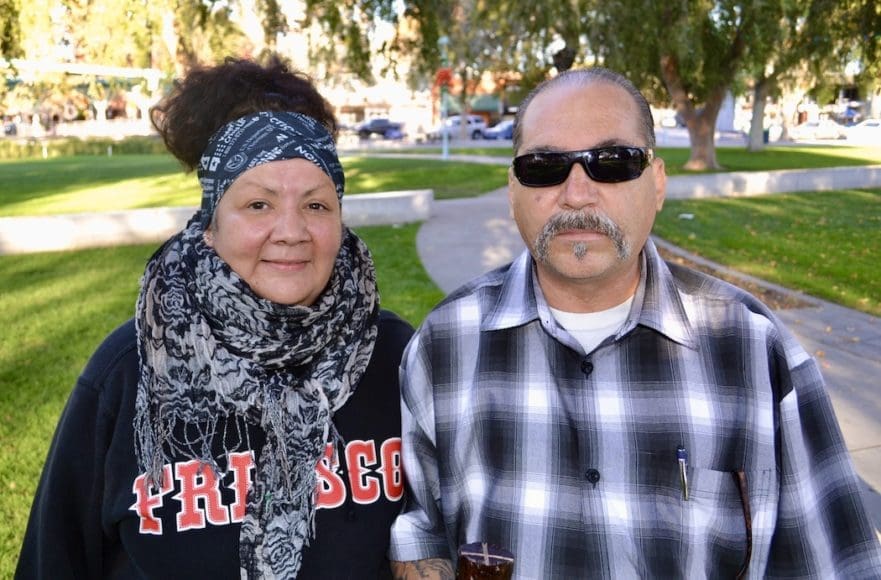As Brown Berets, Jessica Aguallo-Hurtado and her husband, Jesse Hurtado, travel throughout California to help the underserved in the Latino community. They tackle, for example, police brutality, immigration reform, and education issues. Recently, they added housing justice to their activism. What was happening in their hometown of Concord, a middle- and working-class city that’s 22 miles northeast of Oakland, could no longer go unattended.
“You have family after family saying they had bugs, living in places that were uninhabitable.” Jessica tells me on a Saturday afternoon. “And if they said anything, they were worried they’d get a huge rent increase or evicted.”
Jessica, Jesse, and I meet at a coffeehouse across the street from Todos Santos (or “All Saints”) Plaza, the historic, tree-lined downtown park that features a bronze statue of Don Salvio Pacheco, who founded Concord in 1869. Jessica and her family are native San Franciscans. Jesse, a disabled veteran, is from Los Angeles. Jessica and her elderly parents moved to Concord from San Francisco because the rent was getting too high, and she wanted to look after them. Jesse, who’s a general in the Brown Berets, joined them.
The Brown Berets, a social justice organization, was founded in the late 1960s in Los Angeles — and became an integral part of the emerging Chicano movement. They fought police brutality; they opposed the Vietnam War; they pushed back against discrimination; and they turned into a national movement with chapters in, among other places, Arizona, Texas, Oregon, and Colorado. The Brown Berets is smaller now, but its members are still active, still fighting the good fight. That includes, of course, Jessica and Jesse.
The two make for an interesting couple. Jessica is 54 years old, gregarious, knowledgeable, and passionate, giving the impression that she’s unstoppable.
“I have always been a champion of the underdog,” Jessica says.
Jesse, who uses a thick, wooden walking stick to get around, is 60 years old, laid back, and quiet, but just as passionate as Jessica. One gets the feeling that he’s strategizing as he listens.
“I keep saying,” Jesse tells me, “‘We have to do it L.A. style. We have to get into people’s faces. They’re not going to listen.’”
He was referring to the Concord City Council, who, year after year, has done little, if anything, to protect renters from predatory landlords.
“Concord is very conservative,” Jessica explains. “People think you don’t treat your politicians that way. But my husband and I are saying you have to march. You have to protest. The politicians are on the side of the landlords.”
That refusal to help has especially impacted residents of the “Monument,” a largely Latino neighborhood in Concord, where people are facing rent hikes of $200 or $300 or $500 per month.
“The landlords are raising rents so much,” says Jessica, “and the tenants can’t afford it. The rent increases are out of control.”
For several years, Concord residents and activists have sought stronger renter protections, such as just cause eviction, an anti-rent gouging cap, and better tenant-landlord mediation, but city politicians have resisted. It’s the same kind of indifference by elected leaders that renters and activists are dealing with in other parts of California.
“How can you sit back when they treat you like that?” Jesse reasons.
Jessica believes it’s part of a larger plan hatched by City Hall to clear the way for more affluent residents and gentrify Concord.
“They want the tech industry to come into the area,” she explains. “And they don’t want poor people around… It will only be a matter of time that, citywide, Concord will not be affordable.”
That’s not a wild conspiracy theory. Housing activists, for years, have been saying something similar in San Francisco and Los Angeles, where land-use policies pushed by city politicians have favored corporations and luxury-housing developers and fueled gentrification in working-class communities of color.
“We want the City Council to recognize tenants, especially in the Monument, as constituents that they should take care of,” says Jessica.
To that end, only a few months ago, Jessica and another Concord activist, Betty Gabaldon, established the first citywide tenants union in Contra Costa County: the Todos Santos Tenants Union. Betty, who came up with the idea, is president. Jessica is vice-president.
News of the ground-breaking tenants union made headlines throughout the Bay Area. At a press conference, Betty put the politicians on notice: “Here in the city of Concord, there is no protection for renters. We want to send a message that we, as tenants, are not alone.”
The tenants union will push for, among other protections, rent control and just cause eviction — a landlord must have a good reason to kick someone out of his or her home.
“We’re pushing the idea that housing is a human right,” says Jessica.
She adds, “The main goal is for renters to empower ourselves. We will be a force that the City Council must pay attention to.”
For Jessica, Jesse, and the Todos Santos Tenants Union, the days of being treated like second-class citizens are over.

